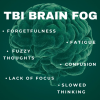Planning:
Planning is a fundamental executive function skill that is necessary to be successful throughout our day. It requires us to think critically about future events in our lives such as our long-term goals, important occasions, our daily schedules, or even preparing a grocery list. It is a necessary higher level skill that allows us to be independent in our everyday activities and the commitments in our lives to be a productive member of society. The components necessary for planning includes:
- Time management skills
- Understanding the concept of time
- Anticipating how long a task is going to take
- The amount of time (e.g., days or hours) until the task needs to be completed
- Anticipating events that might occur that could cause a delay such as traffic
- Being realistic about what you can accomplish each day
- Being able to break down the steps of the task
- Sequencing (putting in order) the steps of the task
- Requires individual to mentally visualize the task
- Prioritizing the steps
- Understanding the steps needed and prioritizing them based on either the importance of activities, difficulty level, the order, or the amount of time a task will require
- Organization skills
- Putting your thoughts together and arranging them based on the steps listed above to begin the process of carrying out your task (e.g., writing down your plan).
| Examples of Planning | Deficits in Planning | Strategies |
|
Difficulty in:
|
|
Organization:
Organizational skills go hand in hand with planning skills. Planning involves making decisions, whereas organizing involves acting out on those decisions or plans. Utilizing good organization skills will help you be more successful in preparing for the goals that are important to you. Organization skills does not only refer to visually organizing information such as writing things or cleaning your workspace, but mentally organizing your thoughts as well. Below is a list of organization examples of what you might see in someone who experiences deficits in organizational skills.
| Examples of organization skills | Deficits in organizations skills |
|
|
Strategies to increase organization skills includes:
- Writing down notes in its designated area to easily find information
- For example, if you use a desk calendar, writing all of your goals on that calendar rather than writing a few on your phone, desk, and computer calendar.
- This helps you reduce losing and misplacing any information
- Categorizing items
- Finding themes or similarities
- Placing items in its designated location
- Organizing your workspace or room will help you be more productive and work more efficiently
- Using storage boxes to reduce clutter and create a neat workspace with minimal distractions
- Clean out items often to see if there is anything that is irrelevant or misplaced
- Separating your work by using folders for different subjects and labels as well
- Labels will help you easily find and place your work where it needs to be stored
- Being visually attentive to detail which includes:
- Crossing items off once finished to see what visually needs to be completed next
- Highlighting important information to make sure you attend to it
- Decluttering as much as possible (e.g., workspace and laptop)
- Creating short-term goals for your long-term goals
References:
CogniFit. (2020). Planning: Neuropsychology of the executive functions. CogniFit. https://www.cognifit.com/science/cognitive-skills/planning#:~:text=Adults%20and%20children%20who%20show,more%20smaller%2C%20more%20manageable%20parts
Strategic Planning: Why It Makes a Difference, and How to Do It. (2009). Journal of oncology practice, 5(3), 139–143. https://doi.org/10.1200/JOP.0936501
Catroppa, C., & Anderson, V. (2006). Planning, problem-solving and organizational abilities in children following traumatic brain injury: Intervention techniques. Pediatric Rehabilitation, 9(2), 89–97. https://doi-org.westcoastuniversity.idm.oclc.org/10.1080/13638490500155458



